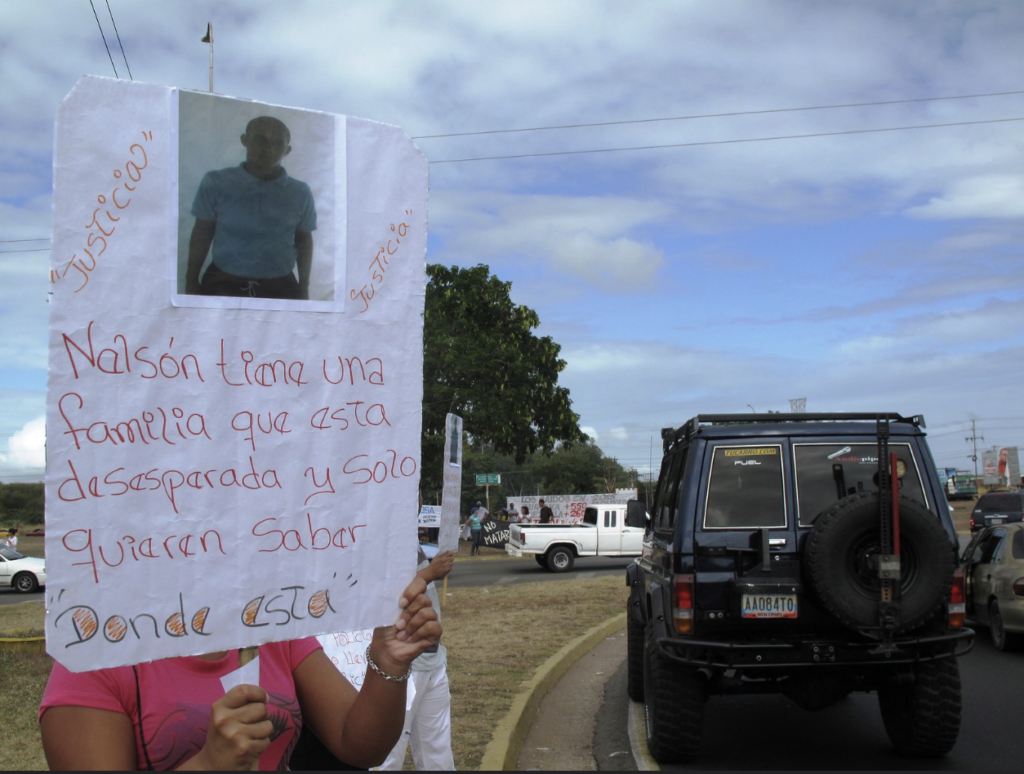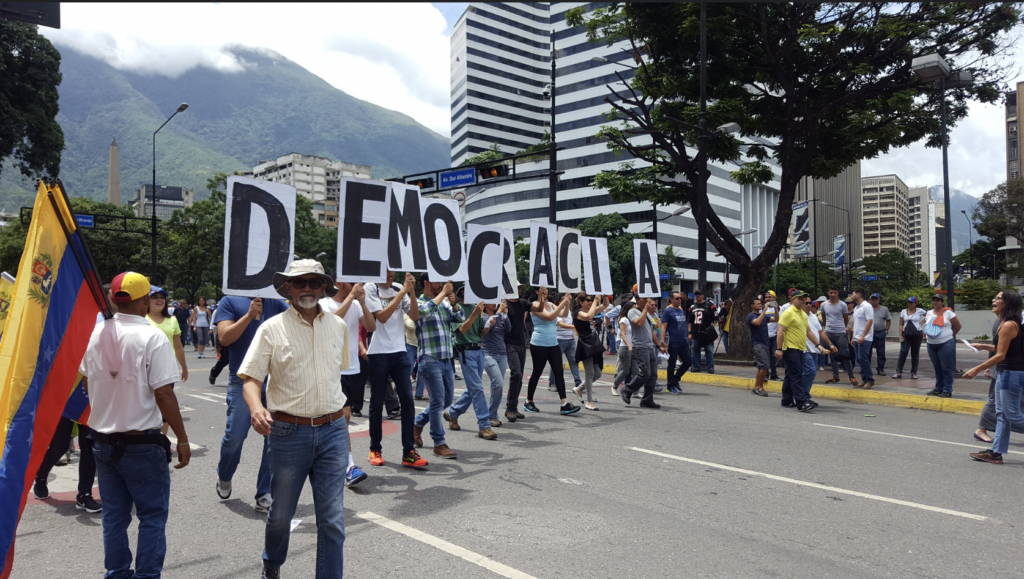Can We Finally Talk about Maduro's Desaparecidos?
Latin America’s political memory abounds in thoroughly documented narratives about the right wing dictatorships disappearing people. The Chavista regime joined that horror club years ago


Desaparecidos. There are books, songs, films, murals; it’s almost a genre in Latin American culture, a thick corpus of stories where a car with no plates spits out a squad of fast and efficient security officers who knock down a door in the middle of the night and rips out a family by taking a human being with them, and throws them to a dark limbo that might include isolation, torture, rape and death, where there’s no official record, no accountability, and in many cases no end: not even a body to bury and mourn.
The legal term is enforced disappearance: a complex, encompassing form of human rights violation that deprives citizens of their freedom to keep them incommunicado, sometimes forever. It involves physical brutality, weaponizes bureaucracy and imposes silence on a space where there was a voice claiming for justice.
Amnesty International defines its victims as persons who are removed from contact with their loved ones and their community when State agents—or those acting under consent of the State—detain them and then deny the apprehension, and/or refuse to say where they are. “In any case, enforced disappearance is always a crime under international law,” notes Amnesty.
Today, what has been happening in Venezuela since July 28th could be recorded as the first time in recent history that we have massive numbers of enforced disappearance in the Americas.
Not all dictators have cases of forced disappearances on their record, but each regime that does it, is not a democracy.
The United Nations designated August 30th as the International Day of the Victims of Enforced Disappearances. The date was established in 2010 to honor victims and promote memory, truth, justice, and reparations, as well as measures of non-repetition, especially in Latin America, where enforced disappearances were common practice during military dictatorships, especially— but not exclusively —in Chile, Argentina and Uruguay in the 1970s.
Today, what has been happening in Venezuela since July 28th could be recorded as the first time in recent history that we have massive numbers of enforced disappearance in the Americas.
According to the last official figures at the time of writing, 2,229 people have been detained during the last month. Marino Alvarado, one of the coordinators of human rights NGO Provea, says that about 80% of these detainees have been victims of enforced disappearance of short duration. “Massively, as it has happened in Venezuela, I would say that it has no precedents since Pinochet’s coup in Chile (almost 51 years ago). There are worrying situations of recent forced disappearances in Cuba and Nicaragua, but not involving thousands of people, as it is happening in Venezuela,” says this longtime human rights activist, who worked to denounce abuses committed in the country after the wave of looting and repression of 1989 and the Chavez coup attempt of 1992.
The patterns and the investigations
The most significant precedent of mass enforced disappearances in modern Venezuela took place in 1989 after the Caracazo, extensively documented by the Committee for the Families of Victims of February-March 1989 (Cofavic). These cases were among the first recognized in Venezuela and drew attention from institutions like the Inter-American Commission on Human Rights (IACHR).
In December 1999, when Chavez was already president, another four notable forced disappearances happened in the wake of the Vargas disaster, such as the case of Oscar José Blanco Romero’s. In 2007, the Inter-American Court of Human Rights found the Venezuelan State responsible for his disappearance and ordered the government to take measures to address the violations, including reparations to the victims’ families.

The Maduro regime’s response to demonstrations in 2014 and 2017, and the ongoing political persecution of civilians and military officers, both in opposition organizations or formerl chavista groups, produced more cases. In a report released in 2020, Venezuelan NGO Foro Penal and Robert F. Kennedy Human Rights, a nonprofit organization based in the United States, documented 200 cases of enforced disappearances in 2018 and 524 in 2019. “Our report details the unmistakable pattern of state-sponsored terror by the Bolivarian regime, the high cost of impunity, and the urgent need to stop these massive crimes now,” said Kerry Kennedy, president of Robert F. Kennedy Human Rights.
Enforced disappearances have been documented also in the gold mines in Bolívar state, perpetrated by state and non-state actors.
In September 2019, the United Nations Human Rights Council established the Independent International Fact-Finding Mission on the Bolivarian Republic of Venezuela. The mandate has been extended until September 2024. This Mission has presented four reports, documenting cases that the experts have reason to believe are crimes against humanity, including torture and Sippenhaft: a German term that defines a Nazi practice of punishing several members of a family to force certain persons of interests to submit themselves to the government. The investigation of the International Criminal Court also includes enforced disappearance “committed by State authorities on the territory of Venezuela.”
Enforced disappearances have been documented also in the gold mines in Bolívar state, perpetrated by state and non-state actors.
“Authorities not only failed to prevent and investigate such abuses, but the Mission has received information indicating collusion between state and NSA actors in parts of Bolívar state,” said the UN Independent International Fact-Finding Mission in 2022. At least 150 stories were documented by the Fosas del Silencio project, including the murder of Indigenous leaders and sex workers, human trafficking, child slavery, and clandestine mass graves reported by NGOs in a region marked by massacres and the violent blattle for the control of gold. You can read some of these stories here.
Alcedo Mora was a social and political activist known for involvement in various leftist movements. Before his disappearance in 2015, he had been actively denouncing corruption and fuel smuggling involving officials from the state oil company, Petróleos de Venezuela (PDVSA), and members of the Mérida state government. According to Provea, Bolivarian Intelligence Service (Sebin) officials are allegedly responsible.
The particular pattern in Venezuela, after the presidential election, is enforced disappearance of short duration: the victims remain incommunicado for several days until their relatives or lawyers find out where they are being imprisoned.
Another example is Hugo Marino’s disappearance in April 2019. Marino, an Italian Venezuelan diver and underwater diving expert, provided services to various official entities in Venezuela, including work related to investigating aircraft accidents. His family and human rights organizations have accused the Venezuelan government, particularly Sebin. Neither Mora’s or Marino’s whereabouts or remains have been located.

Most recently, UN experts reported on April 30th an “alarming increase” of this crime in Venezuela. From January 2023 to March 2024, the United Nations documented at least 18 enforced disappearances. Most of the individuals affected were charged with conspiracy, terrorism, treason, and money laundering.
In the last ten years, short-term enforced disappearances have been the trend, but with increasing violence.
The particular pattern in Venezuela, after the presidential election, has been enforced disappearance of short duration: the victims remain incommunicado for several days until their relatives or lawyers find out where they are being imprisoned.
This practice has been increasingly reported in various contexts, during demonstrations and security operations around the world. However, “it does not matter how long the disappearance lasts: if the authorities do not inform where the detained person is, it is an enforced disappearance,” insists Alvarado. For the Committee on Enforced Disappearances and the Working Group on Enforced or Involuntary Disappearances, “there is no time limit, no matter how short, for an enforced disappearance to occur. Every minute counts when a person is placed outside the protection of the law. And when a person has disappeared, every minute of anguish spent by his or her relatives without news is too much,” as they stated in 2016.
This is the situation of Americo De Grazia, an opposition leader from southern Venezuela, detained on August 7th. His family still does not know his location. Several other political opposition figures have been subjected to this human rights violation.
Marino Alvarado points out that, in the case of the 2,229 detentions announced by Nicolás Maduro, “practically 80% suffered forced disappearance because it took up to 10 days for the relatives to learn where their loved ones were. This has become a policy where every politically motivated detention involves enforced disappearance. No one is spared.”
Featured image: Miguel Gutiérrez/EFE
Caracas Chronicles is 100% reader-supported.
We’ve been able to hang on for 22 years in one of the craziest media landscapes in the world. We’ve seen different media outlets in Venezuela (and abroad) closing shop, something we’re looking to avoid at all costs. Your collaboration goes a long way in helping us weather the storm.
Donate




